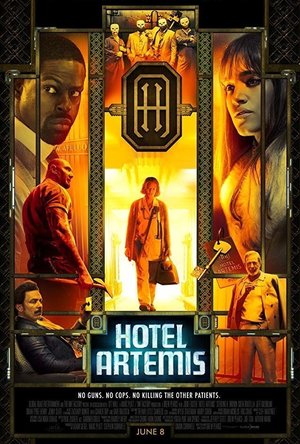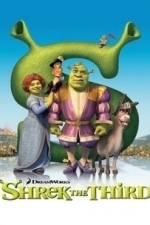
Sky Gamblers: Storm Raiders
Games and Entertainment
App
Apple Design Award 2013 Winner! Launched as Editor's choice on the AppStore! Slide To Play - 4 out...

Royal (Foster Bros #2)
Book
Royal When Royal wakes up in a hospital bed, confusion and then panic have him frantically...
Contemporary MM Romance
Gareth von Kallenbach (980 KP) rated Hotel Artemis (2018) in Movies
Jun 19, 2019
The Nurse (Jodie Foster) runs the facility and with the help of her massive Orderly Everest (Dave Bautista), they ensure that only members get admitted and follow the rules as well as receive state of the art care while in the facility.
Guests at the facility are giving names based on the suite in which they are assigned which involve geographical locales and there are a very strict set of rules they must follow such as no guns, bombs, killing other guests, and so on.
The Hotel Artemis is not a simple stitch and bandage facility as they offer advanced medical services such as Nanites, replacement organ printing, robotic A.I. medical treatment and other services which in 2018 seem like Science Fiction.
Enter Waikiki (Sterling K. Brown), who has tried to leave his criminal past behind him yet was savvy enough to keep paying his membership fees at the Artemis all the while. He and his brother have been injured in a heist and with the city under a deadly riot, they make their way to the Artemis to get treatment and hide out from the chaos outside.
Thanks to their services, the hotel is rarely empty and an Arms Dealer named Acapulco (Charlie Day), and an assassin named Nice (Sofia Boutella), are also in residence. The fact that Nice and Waikiki have a past association makes things a bit interesting as guests are always mindful of those around them even though the strict rules of membership exist to ward off any threats or danger to the guests or staff.
Complications arise when the near capacity hotel is informed that the Wolf King of L.A. (Jeff Goldblum) is en- route. The Nurse opts to follow the rules of first come first served and in doing so enrages his son (Zachary Quinto), who decided to barricade the Hotel to make sure nobody gets in before his father, who incidentally owns the facility.
As if this was not enough of a complication, a police officer from troubled past of The Nurse arrives begging for help which sets a very dangerous chain of events into motion.
The film is a very fresh and entertaining story filled with interesting characters, strong performances, and just enough action to keep the film moving along but yet keeping the focus as a character based drama.
First time Director Drew Pearce gets the most of his cast and has used his script to create a very entertaining and unique film that is well worth a watch. It is so nice to see Jodie Foster showing us once again that she is one of the most gifted actresses of our time as the two-time Oscar winner goes all in to portray a very damaged and troubled character who for what she lacks in glamour; more than makes up for with a determined strength.
I hope this film is a success as I would love to see more stories from the Hotel as I really enjoyed the film from start to finish.
http://sknr.net/2018/06/07/hotel-artemis/
Gareth von Kallenbach (980 KP) rated Shrek the Third (2007) in Movies
Aug 14, 2019
Shrek has grown weary of filling in for the ailing King and years to return to his swamp home with Fiona.
When a twist of fate leaves Shrek in line for the throne, he wants no part of it, and seeks to find the next heir, Arthur (Justin
Timberlake), and install him as the next leader of the land. With Donkey (Eddie Murphy), and Puss In Boots (Antonio Banderas), at his side, Shrek sets off to meet Arthur and bring him to his future
kingdom.
Of course things do not go as planned, as upon meeting Arthur, Shrek and his friends are shocked to learn that he is a meek individual who is constantly picked on by his fellow classmates, and is far from King material.
Undaunted, the trio set back home with Arthur and find themselves at odds over Shrek’s claims that Arthur was granted the throne as the last wish of the former monarch. The fact that Shrek was actually the chosen successor is of little concern to Shrek as he is more concerned with returning home and the recent news that he is to become a father.
When fate steps in and strands them during the journey home, Shrek and friends encounter a former
eccentric professor (Eric Idle) of Arthur, who magically whisks the adventurers
back home, but with some unexpected and amusing side effects.
During this time, Prince Charming has mounted an attack on the Kingdom with the aid of several local villains in an attempt to take the crown for himself and rid the world of Shrek. What follows is a Frantic adventure as Shrek and his friends must find a way to save the day and help Arthur find his destiny.
While I was a big fan of the previous two films in the series, this Shrek did not work for me nearly as well as the other two did.
Yes there are some funny moments and I am sure this film will do huge business at the box office, but it is severely lacking.
First and foremost is the humor in the film, which while at times funny, is far to few and far between to make an effective comedy.
The previous films were loaded with laughs and pop culture references which in this one are more subdued and confined. I kept thinking while I watched the film that much of this film could easily have been comprised of outtakes from the previous films as there is precious little new material in the film and many of the jokes just do not seem that inspired.
Another issue with the film is that Murphy and Banderas are far to underused especially since their characters are the most interesting in the film, and they generate the biggest laughs when they are allowed to shine.
The film has a cute quality to it and own its own, it would be a decent family film. However when compared with the previous film in the series, this Shrek is Far, Far and Away the worst of the three.

SALAH Guide(VIDEO)+Audio (Quran & Sunnah)+(Q & A)
Education and Reference
App
☀ Salah/PRAYER VIDEO & Audio Step By Step Guide+(Q&A) ☀ APP MOST IMPORTANT FEATURES ➴ ➥...

CARROT Fit - 7 Minute Workout & Weight Tracker
Health & Fitness and Entertainment
App
Make getting in shape suck so much less with CARROT's hilarious fitness app. ** Featured by Apple,...

Shaadi.com
Social Networking
App
Shaadi.com, the World's Largest Matchmaking Service, is not just any matrimonial site. With a new...
Gareth von Kallenbach (980 KP) rated Encanto (2021) in Movies
Nov 15, 2021
In the new Disney film “Encanto”; audiences are told the story of how the family patriarch founded the community with a magical candle and how upon reaching a certain age; all members of her family receive a “gift” from the magical house which gives them an ability to help the community. From being able to heal with cooking to talking to the animals and super strength; the family Madrigal is the beloved pillar of the community.
To every rule there is an exception and young Mirabel (Stephanie Beatriz); is the only member of her family not to receive a gift of powers. As such she is seen as a pariah from the family and believes she is more tolerated than loved especially compared to her siblings who are endowed with amazing abilities.
Things change when a new member of the family goes through the gifting ceremony; the first one since Mirabel was denied, and receives an amazing gift and basks in the love of the town and family. Mirabel has a vision of the house cracking and falling into ruin. She tries to warn her family but they see the house in its usual pristine condition and blame Mirabel for being jealous for not having a gift and wanting to take attention away from those who do.
Mirabel believes in what she saw and learns that members of her family may know more than they admit and that they hold the key to saving the day. This leads to a quest to find the absent Uncle Bruno (John Leguizamo); who has been absent as many believe his gift of prophecy only leads to bad things coming to fruition and has gone into hiding as a result.
Mirabel is soon forced to look deep inside herself and find her strength to overcome her own insecurities and save her family and community.
The film has great animation and is awash in color as it brings the magical community to life. The music is lively and is what you would expect from Lin- Manuel Miranda as it brings joy and energy to the film that is in keeping with the Disney tradition of amazing music in their animated films.
The biggest issue that I had with the film is that while fun and entertaining; the story never took the next step forward and at times dragged. This is not to say that “Encanto” is a bad film as it is lively, colorful, and fun; however it does not reach the heights of Disney classics like “Frozen” “Moana” and other classics. Think of it this way; “Lilo & Stitch” is a fine animated film but few would hold it in the same regard as “The Lion King”, “Beauty and the Beast”, and “The Little Mermaid”.
In the end “Encanto” offers a fun experience for the family and fans to enjoy and shows how even when they do not hit the top of the mountain; Disney is still the Gold Standard in animation.
4 stars out of 5




